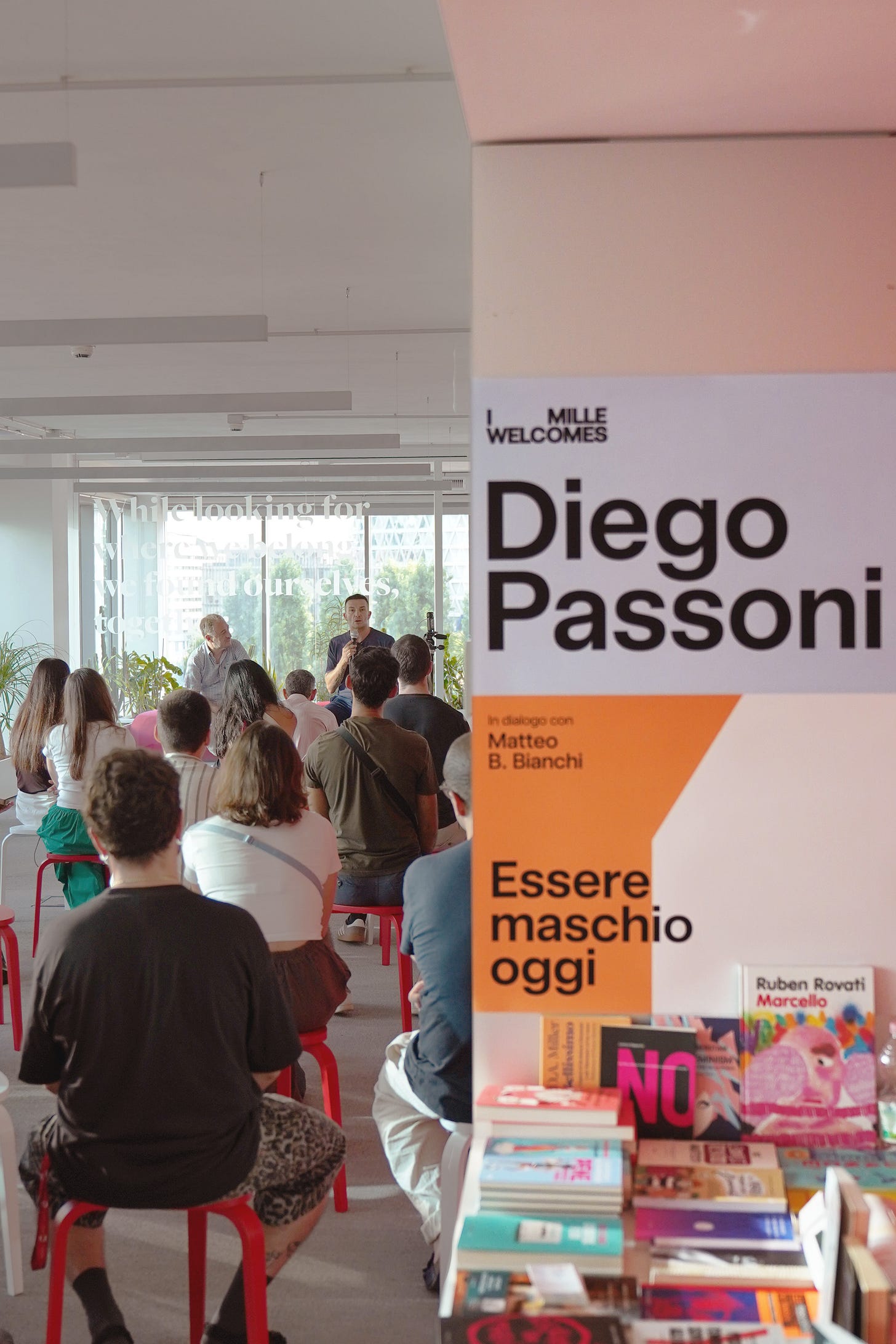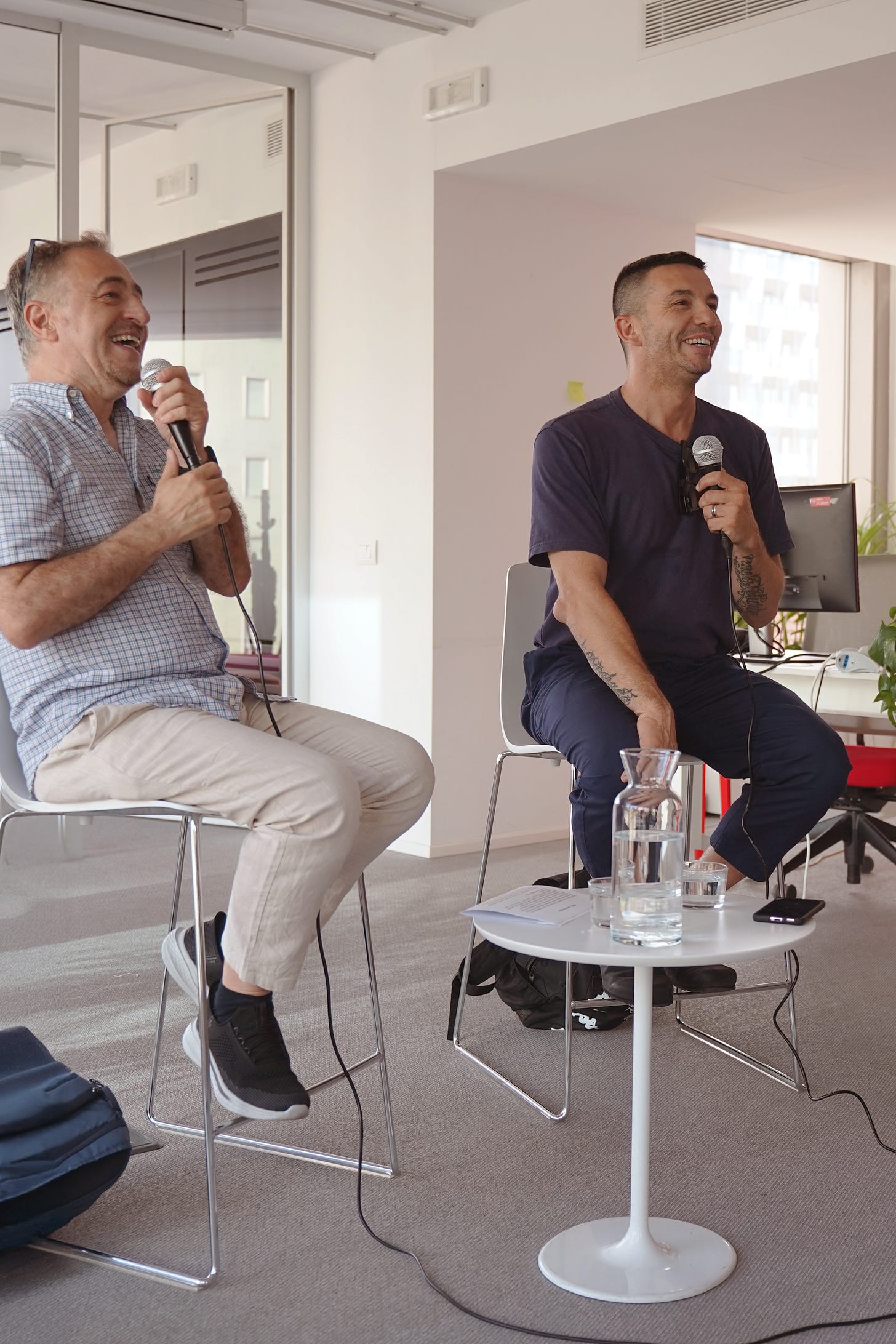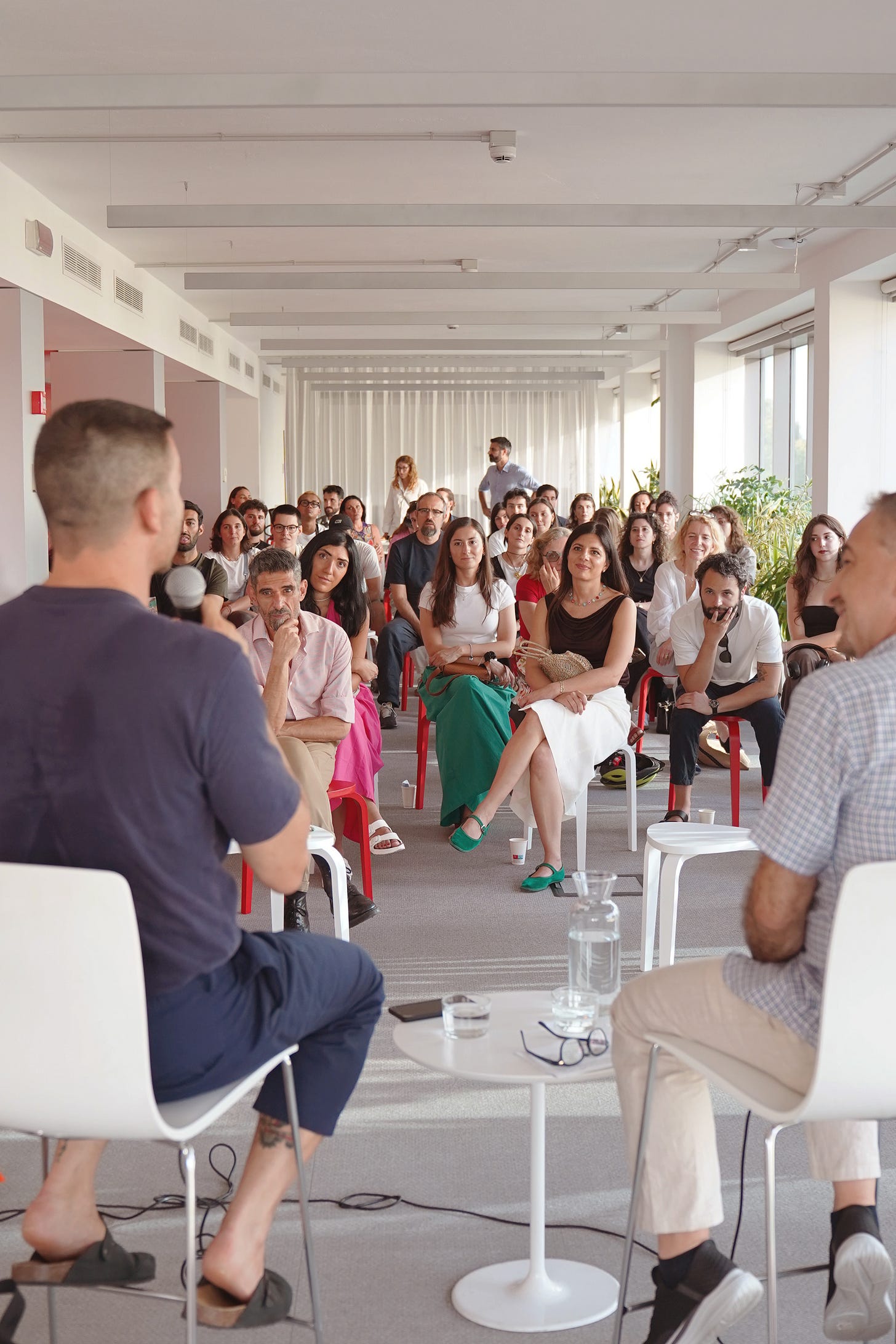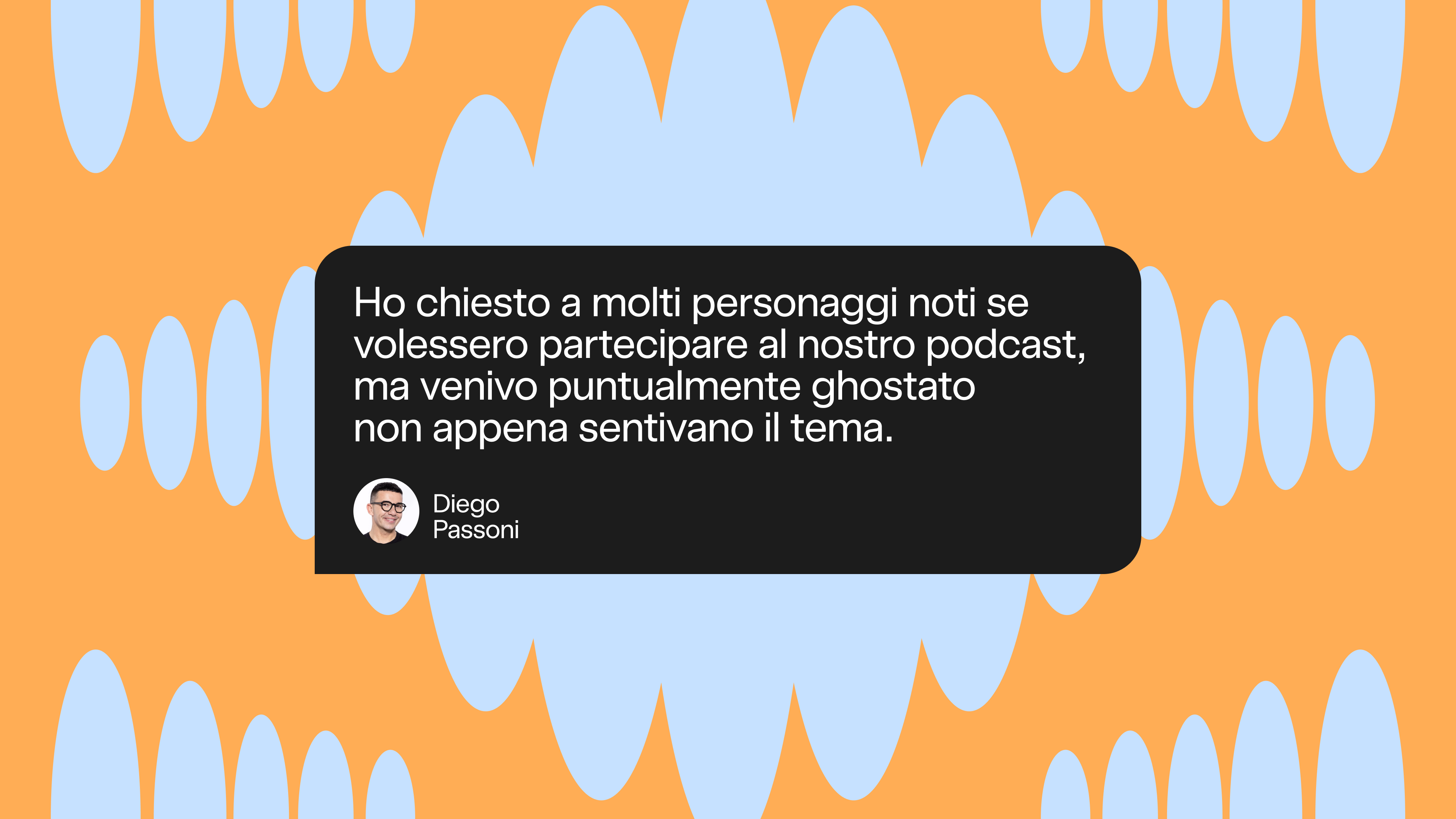Diego Passoni is a beloved voice on Italy’s Radio Deejay, co-hosting the hugely popular daily show Pinocchio, alongside La Pina and La Vale. But Diego’s reach goes beyond the airwaves: he's also a writer, activist, and podcast creator. His latest podcast, provocatively titled C**i Nostri: Cose tra maschi (“Our Own Damn Business: Guy Talk”), dives headfirst into contemporary masculinity, spotlighting the vulnerabilities and insecurities men typically hide away. We invited Diego to continue this conversation around inclusivity, a topic championed by our Gender Equality Committee. Writer Matteo B. Bianchi chatted with Diego as part of our “I MILLE Welcomes” series.
Your podcast deliberately pushes buttons. Why do you think it’s still so difficult for men to open up about these issues?
This podcast was born precisely to spark the conversations men tend to avoid. I wanted my guests – some famous, some less so – to speak openly, authentically, about often-hidden sides of their masculinity: emotional fragility, sexual anxieties and health concerns.
Finding guests wasn’t easy. Many celebrities ghosted me the moment they heard the topic. That silence speaks volumes about how difficult it remains for men to show vulnerability.
Masculinity, culturally speaking, is still tied to physical strength, sexual prowess and financial success. Everything revolves around “more”: more money, more power, more success. Revealing weakness or uncertainty is taboo.
For example, if I had an issue “down there”, logic says I should talk to a friend or my dad about it. But between men, this just doesn’t happen. The old ‘80s ad slogan, "The man who never has to ask”, which still perfectly encapsulates this mindset.
Men still lack the emotional and relational space to comfortably reveal their vulnerabilities. A recent international study published by Il Post showed that excessive masculine bravado has real, negative consequence – even lowering men’s life expectancy.
The emotional strain from always having to be strong, always first, always protective, is enormous and mostly silent. Here’s a crucial yet simple question: why can’t a friend or colleague just ask “Hey, are you okay?” when another guy seems troubled?

After collecting so many stories, what do men feel most ashamed about? What topics cause the most embarrassment?
We’re still stuck at square one. Even the thought of going to a urologist triggers anxiety that something’s fundamentally wrong with their masculinity. Nobody judges you for an elbow problem, but if it’s about your testicles, shame instantly takes hold.
A while back, I had a minor infection and went to the urologist. He started reassuring me: “You look very fit, your penis is normal, your testicles are normal”, and so forth. Eventually, I asked him why he felt obligated to say these things. He explained he had to reassure patients because every man who comes in is terrified of being judged. They even give silly excuses: “It’s cold today, normally it’s bigger”. To a urologist, who literally sees dozens a day! We’re such idiots.
One listener told me his father chose to die of prostate cancer rather than endure the embarrassment of a urology exam. That’s the level of taboo we’re dealing with.
How has the concept of inclusivity changed over the years? What’s the most effective way to communicate inclusivity today, in workplaces and schools?
We’re far from truly understanding inclusivity, though there are some inspiring examples. Activist Valentina Tomirotti proposed a law making concerts accessible to people with disabilities. Before that, no one even noticed the injustice of relegating wheelchair users to marginal spaces with poor visibility.
We only see issues that directly affect us. To communicate inclusivity effectively, we must be concrete. For instance, have you ever tried withdrawing cash from an ATM while sitting in a wheelchair?

How do you manage the overwhelming daily influx of information?
It’s a constant challenge. Digital life complicates everything, making it hard to deeply engage. Personally, I carve out a couple of hours each Saturday to delve into specific topics. I never feel fully informed, but I try to stay updated by choosing trustworthy sources and allowing myself time to truly read.
I’m no expert in masculinity, and the podcast actually grew from my own questions on the subject.
Based on your experience, how can men realistically start these conversations with friends? What’s the first step to making this shift happen?
Like any new habit, it’s about repetition. The first conversation might be awkward, but it gets easier with each try. You need to create a situation where vulnerability can emerge naturally. It just takes one person to start by openly saying, “Guys, I have a problem”. This simple act immediately makes space for others to respond, “You know what? Me too”.
On our radio show, we once offered a free urological exam to listeners. A truck driver responded, taking along a friend and coworker. Imagine all the dinners and evenings they spent together without ever addressing this issue. That small act created genuine, healthy intimacy between them.

My urologist and podcast co-host Nicola Macchione, who’s also active on social media, often says, “I dream of a world where boys start visiting a urologist at 12 or 13, just like girls with gynecologists”. It’s absurd that this still doesn't happen, especially since testicular cancer primarily affects men aged 18 to 30. We need to break this resistance, perhaps by trying new approaches, like group visits to the urologist, or bringing a urologist into companies once a month for anyone who needs a check-up. That would be a good start.ssato insieme senza affrontare l'argomento. Quel gesto ha creato un'intimità sana tra loro.
Vulnerability Isn’t Weakness: 4 Takeaways
- Taboo as a communication barrier: Male health and vulnerability remain so taboo that even public figures shy away from discussing them. Recognizing these taboos is essential to overcoming communication barriers.
- The ghosting paradox: Getting “ghosted” when tackling tough topics isn’t failure. It might mean you’ve touched a nerve.
- Vulnerability boosts engagement: The urology check-up experiment succeeded because it gave men social permission to be vulnerable. Effective communication doesn’t reassure—it allows recognition of real issues.
- Concrete examples win: When discussing inclusivity, practical examples (like wheelchair-accessible ATMs) speak louder than abstract theories.
